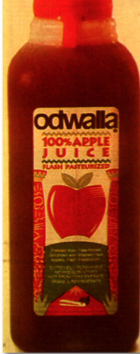In October, 1996, 16-month-old Anna Gimmestad of Denver drank Smoothie juice manufactured by Odwalla Inc. of Half Moon Bay, Calif. She died several weeks later; 64 others became ill in several western U.S. states and British Columbia after drinking the same juices, which contained unpasteurized apple cider –and E. coli  O157:H7. Investigators believe that some of the apples used to make the cider may have been insufficiently washed after falling to the ground and coming into contact with deer feces.
O157:H7. Investigators believe that some of the apples used to make the cider may have been insufficiently washed after falling to the ground and coming into contact with deer feces.
In the fall of 1998, I accompanied one of my four daughters on a kindergarten trip to the farm. After petting the animals and touring the crops –I questioned the fresh manure on the strawberries –we were assured that all the food produced was natural. We then returned for unpasteurized apple cider. The host served the cider in a coffee urn, heated, so my concern about it being unpasteurized was abated. I asked: "Did you serve the cider heated because you heard about other outbreaks and were concerned about liability?" She responded, "No. The stuff starts to smell when it’s a few weeks old and heating removes the smell."
Yesterday, Baugher’s Orchard and Farm in Westminster, Maryland, announced to local fanfare – and some customer distress — that it will change the way it produces apple cider in the future after E. coli infections were linked to the product this fall.
Dr. David Blythe, medical epidemiologist from the Department of Health and Mental Hygiene, said environmental and product testing of the apple cider was conducted in November and December in an attempt to confirm a link between seven cases of a specific strain of E. coli infections that began appearing in mid-October that was believed to be associated with the consumption of Baugher’s unpasteurized apple cider.
Three of the seven cases resulted in hospitalization. Five of the seven cases were children younger than 18. All afflicted people recovered and those hospitalized were discharged, Frances Phillips, Deputy Secretary for Public Health from the DHMH said.
Blythe said the E. coli strain was not found in any of the tested samples, but that they were not able to test from the batch of apple cider that is suspected of causing the sickness.
Though they cannot make any conclusions from the testing, Blythe said the information collected, like interviews from those affected by the E. coli strain, still points to the apple cider as what made people sick.
Dwight Baugher, farm manager, said they are not currently making any apple cider. The company typically makes cider from about mid-September through mid-March.
 "There’s no way of knowing if we had anything to do with it," he said.
"There’s no way of knowing if we had anything to do with it," he said.
Though they have not found out the source of the E. coli strain, they are working on changing the apple cider production process to include pasteurization.
